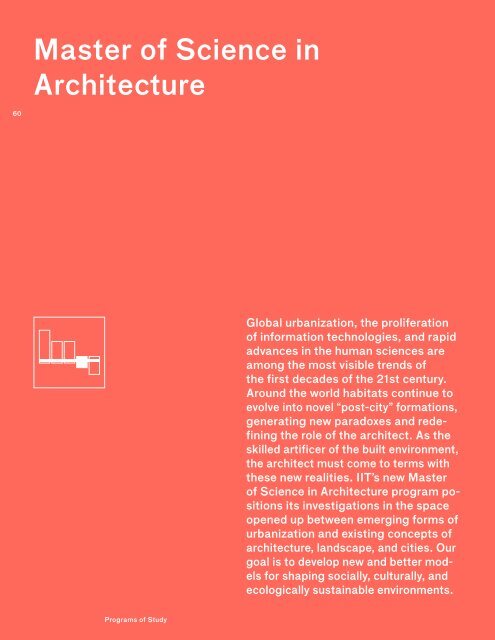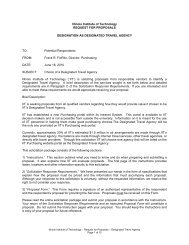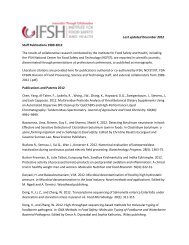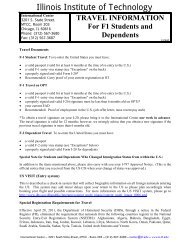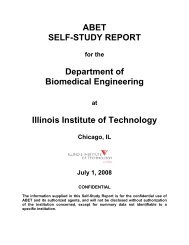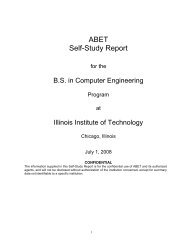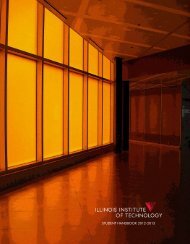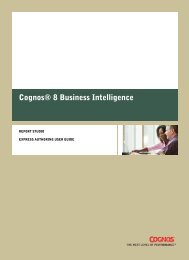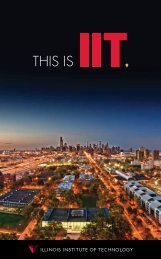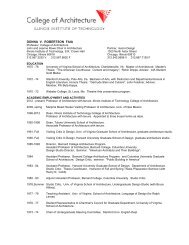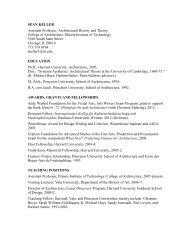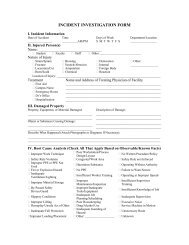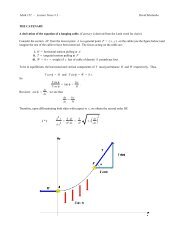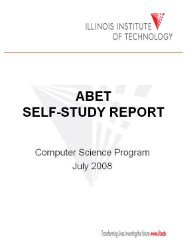Nowness - Illinois Institute of Technology
Nowness - Illinois Institute of Technology
Nowness - Illinois Institute of Technology
You also want an ePaper? Increase the reach of your titles
YUMPU automatically turns print PDFs into web optimized ePapers that Google loves.
Master <strong>of</strong> Science in<br />
Architecture<br />
The discipline <strong>of</strong> architecture can no longer<br />
rely on received ideas, established typologies,<br />
or fashionable design methodologies. Today<br />
the challenge <strong>of</strong> education at all levels is to<br />
embrace our generational transformations,<br />
and to engage them in such a way as to create<br />
new knowledge. The new Master <strong>of</strong> Science<br />
program provides an intellectual climate in<br />
which to reflect upon the forces shaping the<br />
contemporary world and their implications for<br />
architecture, landscape, and urbanism. With<br />
a dual commitment to research and reality,<br />
we are aware <strong>of</strong> the imposing nature <strong>of</strong> the<br />
problem at hand, as well as <strong>of</strong> the degree <strong>of</strong><br />
understanding that is needed simply to measure<br />
or fathom its depth. Through design,<br />
the program seeks out and experiments<br />
with alternative models for constructing the<br />
built environment. Engaged with the real-life<br />
conditions represented by public authorities,<br />
cultural institutions, and private entities, the<br />
curriculum insists upon continuous exchange<br />
and debate.<br />
The new Master <strong>of</strong> Science program<br />
seeks to be synthetic and inter-disciplinary in<br />
its approach. In contrast to an increasingly<br />
compartmentalized design pr<strong>of</strong>ession divided<br />
into disparate realms <strong>of</strong> expertise, which <strong>of</strong>ten<br />
diminish the designer’s role, the program<br />
endeavors to sharpen critical thinking through<br />
collaborative and experimental working processes.<br />
The intensive three-semester program<br />
(including summer semester) is structured<br />
around two design-based research studios, an<br />
individual or collective thesis project, history<br />
and theory seminars, and two master classes.<br />
The College <strong>of</strong> Architecture’s colloquia,<br />
lectures, and exhibitions expand upon and<br />
augment the curriculum.<br />
More inclusive than traditional architectural<br />
design, yet more form-oriented than<br />
conventional urban planning, our urban-based<br />
design program requires the insights <strong>of</strong> other<br />
disciplines. Striving for experimental and<br />
exploratory methods demands provocative<br />
discourse, distrust <strong>of</strong> earlier approaches,<br />
and the creative invention <strong>of</strong> new forms for<br />
housing vitality and life. In order to achieve<br />
60 61<br />
Global urbanization, the proliferation<br />
<strong>of</strong> information technologies, and rapid<br />
advances in the human sciences are<br />
among the most visible trends <strong>of</strong><br />
the first decades <strong>of</strong> the 21st century.<br />
Around the world habitats continue to<br />
evolve into novel “post-city” formations,<br />
generating new paradoxes and redefining<br />
the role <strong>of</strong> the architect. As the<br />
skilled artificer <strong>of</strong> the built environment,<br />
the architect must come to terms with<br />
these new realities. IIT’s new Master<br />
<strong>of</strong> Science in Architecture program positions<br />
its investigations in the space<br />
opened up between emerging forms <strong>of</strong><br />
urbanization and existing concepts <strong>of</strong><br />
architecture, landscape, and cities. Our<br />
goal is to develop new and better models<br />
for shaping socially, culturally, and<br />
ecologically sustainable environments.<br />
this, the program must be global. The new<br />
Master <strong>of</strong> Science program therefore seeks<br />
to collaborate with colleagues and institutions<br />
worldwide in a collective commitment to<br />
shared knowledge and expertise.<br />
This global program is especially well situated<br />
within the ever-transforming metropolis<br />
<strong>of</strong> Chicago, a city that provides both the<br />
testing ground and the variegated fabric for<br />
the program’s initiatives. Working with governmental<br />
agencies and other public as well<br />
as private constituencies, this program will<br />
achieve a high degree <strong>of</strong> reality and immediacy<br />
uncommon within academia, while providing<br />
partnered agencies with a valuable resource<br />
for exploring issues <strong>of</strong> crucial importance.<br />
Research trajectories will vary each semester,<br />
but the unifying thread will be the commitment<br />
to forge new models, visions, and principles<br />
that better fit with emerging technologies,<br />
new biological insights, and the changing<br />
nature <strong>of</strong> the metropolis. The goal is to find<br />
the right balance between social and economic<br />
sustainability on the one hand, and, on<br />
the other, the creation <strong>of</strong> a living environment<br />
in which the individual will both prosper and<br />
thrive. The program and the student must have<br />
no lesser ambition.<br />
The Master <strong>of</strong> Science in Architecture is a<br />
three semester program (including one summer<br />
semester) that allows students emerging<br />
from B.Arch. and M.Arch. programs to earn<br />
a master’s degree with a research focus by<br />
continuing their studies. For some students<br />
the program may also lead to further studies<br />
and research in the Ph.D. program. Organizing<br />
the performance <strong>of</strong> the “Horizontal Studio” in<br />
which students from all programs interact in a<br />
laboratory <strong>of</strong> design-based research projects,<br />
supported by seminars, lectures, workshops,<br />
and master classes by visiting luminaries, the<br />
program is the pivot point <strong>of</strong> IIT Architecture’s<br />
new curriculum.<br />
Programs <strong>of</strong> Study<br />
Programs <strong>of</strong> Study


